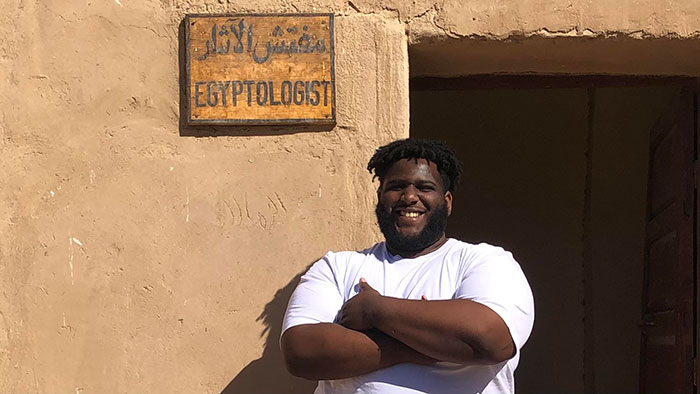Spotlight date | November 25, 2024
Reimagining the sands of time
History is a path to insight, and Charles Rhodes has the map.
History is a destination.
It’s a gateway to different times and places.
As a history scholar, Charles Rhodes found his future in studying the past.
His enthusiasm for history began when he was 17 years old.
“In high school, I was taking dual credit classes, and I took a class called College Western Civilization,” Rhodes said. “It was taught by a teacher at my school. He had a PhD, and so he was a historian. I was just really enamored with him and liked how he thought about history and talked about the past. And that kind of just got me really excited about maybe studying history.”
Rhodes began his undergraduate studies at Missouri State in August 2015. He declared his major in history with a minor in religious studies.
Originally from the St. Louis area, Rhodes wanted to attend “a bigger school."
For him, Missouri State was the right size and the right distance away from home at the right price. It also had the right “feel.”
“I still really love Missouri State’s campus, how compact it is,” Rhodes said. “I also like when you’re walking near the fountain and everything; it’s kind of a nice way to build your day back up.”
Awakening the mysteries of history
In his junior year, he registered for a class about ancient history in the Near East, which was taught by his history advisor, Dr. Julia Troche.
The class focused on ancient civilizations, like Egypt, Mesopotamia, Babylonia and Syria.
“I just had so much fun with it. It was really just questions about ancient ideologies and ancient religion and things like that, and it just reawoken my passion, my interest in history,” Rhodes said.
He credits Troche for being a major influence in his academics. She listened to his ideas and helped cultivate his passion for Egyptology.
“I think, really, that was what made me want to continue pursuing ancient Egypt. It was just that I had a mentor who really showed interest in me."
Another professor who helped him pave his way toward graduate school was Dr. Alicia Walker, an associate professor in sociology.
“She was a great resource during my time at Missouri State. She’s great. Wonderful person,” he said. “And I think she was also one of the first people I told I wanted to get a PhD to during my time at Missouri State. She talked to me a little bit about that process.”
An expedition into ancient wonders
One of Rhodes’ favorite experiences from his time at Missouri State was his Study Away trip to Jordan through the Archaeological Field School.
Having never been outside of the United States, Rhodes stepped out of his comfort zone to engage in a month-long learning experience.
“Having the opportunity to do that — we were working in Jordan in the Middle East — I think it was just a really eye-opening experience for me. Kind of taught me a lot about what field work is," he said.
Opening the door to another country also led him to develop new perspectives and ideas in history and Egyptology.
“I think when you’re not really sure about processes and things like that, and you’re just stuck reading all the time, it kind of gives you a warped understanding of what field work looks like for scholars in the humanities,” Rhodes said. “It also kind of limits you to what you understand is possible, and so I think that field work alone opened me up to different connections. Kind of showed me what’s possible within the field that I’m interested in.”
He further demonstrated his knowledge of ancient Egypt by composing a research essay called “Servitude or Employment: An Analysis of Language Construction and Spelling Surrounding Nubian Mercenaries in the Old and Middle Kingdoms.”
His essay won Best Undergraduate Student Paper in 2020.
Establishing his legacy
After his time at Missouri State, he attended the University of Memphis where he earned his master’s degree in ancient history with a concentration in ancient Egypt.
He is currently pursuing his PhD in Egyptology and Nubian studies at the University of California, Los Angeles (UCLA).
Rhodes hopes to graduate from UCLA in 2028. He plans to use his degree to become a professor.
Paying it forward, he wants to create an environment where future historians can find their interests like he did.
“I think the way in which I was taught at Missouri State is one of the reasons that I want to be in education and want to continue that and hopefully be someone to a student that my mentors were to me,” Rhodes said.
